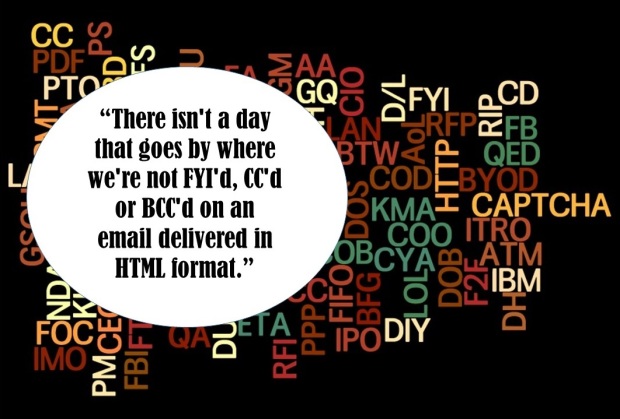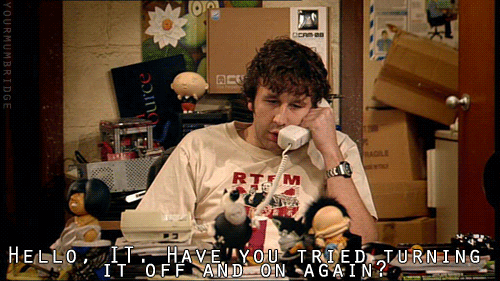Author Archives: Colin
How did our working language become so lazy?
Much has been spoken and written about the new language (driven by social media interaction on Twitter, Facebook, WhatsApp etc.) being introduced into our lexicon by millennials or Gen-Y and their ability to integrate and influence the current working culture by using it. Personally I think they’ll find that it’s not much different to that which they already use, in fact I think they’ll find that their ‘elders’ shorten words and phrases much more than they do. Just because we use it in a business context rather than personal doesn’t make it any more or less acceptable.
It wasn’t always that way.
Liverpool (UK) people – and I’m one – are renowned for shortening words and names. James was Jimmy; off licence (liquor store) was the ‘offy’; the Cavern was the ‘Cav’; and Christmas was ‘Chrimbo’. This is seen as an endearing feature of our regional dialect and in some ways is expected of scousers wherever we go. The closest I got to an initialism when I was younger was my ‘EFC are Magic’ badge, but that’s only because it was hard to fit Everton Football Club on something that was 5cm in diameter.
However, I’m not sure I was prepared for a whole different language once I started work. Obviously there were words and phrases that I was unfamiliar with, but I quickly got to grips with these as I spent the first 2 or 3 weeks learning my trade. Even in those early days of work, I don’t remember too many collections of words or phrases being shortened. The manager was still the manager, dockets were still dockets, close of play was ‘by the end of the day’ and it was all very easy to understand. And then around in late 80s the CD arrived, them some eejit changed personnel to HR, IBM became massive and the working language changed forever (RIP) as we sought to give mundane tasks, projects and job titles ‘flashy’ initialisms or acronyms.
Before I continue, here are a couple of definitions in order to avoid any confusion:
Acronym – an abbreviation formed from the initial letters of other words and pronounced as a word
Initialism – an abbreviation consisting of initial letters pronounced separately
For some reason I don’t have too many issues with acronyms as they don’t feel lazy. NATO, NASA, SIM, SARS and er, ABBA are just some examples. Even though they’re abbreviations, they have the good sense to form themselves into words so as to still sound normal and to make my life easier. Also, I generally know what they mean as it makes sense to pronounce them as a word, especially ABBA.
Initialisms on the other hand tend to confuse me (other than S.O.S) and millions of others worldwide and yet we’re doing sweet FA to banish them from our working culture. They’re growing like weeds in camel dung. Even worse, most organisations now have an acronym dictionary (despite most of them not being acronyms) as part of their induction!
THEM: “Welcome to the company Colin, we’re specifically set up to alienate new starters by using a language akin to Klingon, but worse because this is real, whilst Klingon isn’t*. If you last more than 5 years you’ll have a fighting chance of finally understanding what we’re talking about, although we’ll have introduced some more whilst you’re learning these, so it’s unlikely. No matter, go ahead and read this 4 page PDF acronym dictionary or AD as we like to call it.”
ME: “Right, thanks. Do you have a similar document that articulates your vision and describes in detail the behaviours you expect from me in order that we can share in the organisation’s success?'”
THEM: “No.”
ME: “OMG”
Initialisms are never more rife than within projects. How many of you have a project in your organisation whose name has been shortened to its initials e.g. the BFG project? I rest my case. The bigger projects will be sponsored by the COO with QA from the CFO and CIO, but will ultimately be managed by a strong PM (whose delivery instincts are part of their DNA) with support from the PMO and oversight from HR. There’ll be a PID (with an FAQ section) on the back of a BC and If the project requires any kind of procurement activity, expect an RFI or RFQ, followed by an RFP which will need to be QA’d by those people on the panel. If it’s an IT project there’ll be a weekly PSR and then testing – SIT, BIT and UAT before we decide that all is well and we implement it by writing an EPR to put it into BAU (but only once the PSC has approved it).
There isn’t a day that goes by where we’re not FYI’d, CC’d or BCC’d on an email delivered in HTML format. Oh and BTW, sometimes they require our response ASAP or at the latest by COP today. If you’re a CEO (who likely paid COD for their BMW) you can just get your EA or PA to do it, or else just ask a GM.
*No doubt there is a Klingon language and someone has probably put together a dictionary, I just didn’t want to Google it and have my wife discover it in my internet history.
That’s not motivation, it’s bullying
I worked with someone a few years back who thought that as a leader they were someone to be held up as an example. You know the type, always looking to make a point in perceived ‘important’ meetings by denigrating others; talking about how we could increase business value whilst pursuing personal goals; preaching the need for consistency and yet looking to short cut everything the organisation did; and talking up the team and how motivated they all were, whilst having the highest attrition rate of any area in the business. Self awareness was not a skill.
The behaviours were of particular concern to us as a management group and yet when we raised them as such, we were told that we didn’t understand the motivation skills and we need only look at the performance of the team to see how it was paying off. Our Director did not want to deal with the issues either as he felt that eventually the person would leave and yet, things got progressively worse as we lost key staff.
Behaviours we observed including the following (with the ‘reasons’ they gave provided in brackets):
- Micro management (close coaching in order to lift capability)
- Embarrassing staff members in meetings (immediate honesty is important in order to rectify their approach)
- Over working staff (it’s their job, they need to learn to cope better)
- Overuse of ‘formal’ emails (it’s important that people understand my stance clearly)
- Denying team members opportunities to advance in other business areas (if it’s not right for me, it’s not right for the team)
- Aggression (I’m a passionate person, it’s hard to keep it in check when it’s for the good of the organisation)
- Exclusion or isolation of others (I’ll bring them into the fold when the time is right)
As a management team we sought to address the issues through honesty and yet when I think back now, not one of us used the ‘B’ word. Would it have made any difference if we had? I’m not sure, although I’m sure we’d have possibly sowed a seed of doubt. We discussed the issues with HR, who immediately put them back on our Director to deal with. We raised the issues in our weekly one to one meetings in the hope that they would be addressed, but they weren’t.
In the end the person relocated to another part of the country and decided to resign.
As a leadership team we sought to learn the lessons by publicly reiterating the behaviours that were expected of the team (and what they could expect of us as leaders), we also listed those that weren’t acceptable. We set up an email inbox for staff to report inappropriate behaviours (witnessed or received) and gave our HR representative responsibility for working with managers to deal with any issues quickly.
According to experts Einarsen and Zapf there are five main types of bullying and these should never be seen in the workplace or any place for that matter:
- Work related
- Personal attacks
- Social isolation
- Verbal threats
- Spreading rumours
In a Duncan and Riley study published a few years back, they stated that more than one in five people are bullied at work; in some industries, such as health, welfare, education, government and semi–government services, the figure is far higher, ranging from 25%, 50% to 97%. This is simply not good enough. Every organisation has to take a good look at itself and its culture and ensure that it promotes the good whilst dealing with the bad. And as leaders we have a responsibility to stand up to bullying and ensure we do all we can to eradicate it from our workplace, for ever.
Connect with me on LinkedIn at au.linkedin.com/in/1969colin
Your problem is you
I’m sick of the moaning, seriously I am. ‘Why can’t I have more money?’ ‘Why is this process so hard?’ ‘Why doesn’t the organisation do it this way?’ ‘Why does he/she behave that way?’ ‘I’ve been here a thousand years, why haven’t I been promoted?’. Why, why, why?
I’ll tell you why, it’s because of the following:
1. You lack self-awareness and want others to change instead
2. You lack the ability to grab accountability and make a difference
3. You want everything on a plate without doing any more to earn it
If you wake up every morning (you should celebrate that, by the way) asking yourself ‘why?’, the first question you should be asking yourself, is ‘what can I do to change this situation?’ and guess what, you can always do something because there isn’t a single person in the world who is the model employee and knows everything. So what can you do to change it?
- Can you do that thing that is frustrating you in a different way?
- Can you talk to someone in a different way?
- Can you escalate your problem or ask someone (internal or external) for guidance?
- Is there anything you can do to understand the situation/problem better?
- Are you just reacting badly to a necessary change?
- Do you understand what your priorities are?
- Do you have any kind of plan – that you’re following – to get to the end of what you’re doing?
- Can you just stop thinking about someone else and get on with doing your job to the best of your ability?
- Should you just leave and get another job?
If you want the bigger, better job with more money and responsibility then chances are you’ll have to change. Any kinds of increase (financial or status) will depend on your ability to lead, learn, inspire, encourage, fail, succeed and pass the credit back to the team; oh and to stop whining like a child being forced to eat liver (look, I just hated the texture of it, ok?).
This is how you get noticed. This is how you demonstrate your worth, gain respect and this is the way to contentment in your working life.
If you don’t want that contentment, then pack it in with the moaning during working hours and stop bringing everyone else down because you think the world owes you something. Show up at 9, sit in your corner, do your best, then leave at 5. If you have to moan about it, save it for your partner or pet because your problem isn’t your job, your problem is you.
Five Ways to Protect Office Morale
Freezing the moment
 I’ve reached that time. The time where all of the plans you have made, singularly and collectively, bear fruit. The planning was good and has given us a perfect start for achieving our vision. A vision that will always be aspirational and yet together we agreed that we’d celebrate success at each stage because it wasn’t going to be easy. And this is one of those times.
I’ve reached that time. The time where all of the plans you have made, singularly and collectively, bear fruit. The planning was good and has given us a perfect start for achieving our vision. A vision that will always be aspirational and yet together we agreed that we’d celebrate success at each stage because it wasn’t going to be easy. And this is one of those times.
No one told us it would be like this. Sure, there are books on this stuff. Books that we read voraciously prior to the start and whose knowledge we shared morning, afternoon and night. Some of the advice didn’t suit who we were and wasn’t considered, some was dated and dealt with similarly, save for those valuable lessons learnt. Everyone is different, so we knew that in order to be successful we’d have to come up with something ourselves whilst taking into consideration the advice we were given, both verbal and written.
We decided on our shared vision and set about creating a strong plan to achieve it. Everything we have to do is important, however agreeing our responsibilities is key to the success of this. Each person understanding what they had to do, when they had to do it and critically, how it should be done. We agreed on an approach and felt that appropriate challenge and a small amount of risk taking was important to achieve the right outcomes.
We mapped out all of the critical things that needed to happen and decided on the order and the owners for each. There wasn’t a need for brown paper or post-it notes to map it out, but we talked, a lot. We also spent a lot of time understanding the risks. The vision is big, so it’s fraught with ‘danger’. The risks needed to be fully understood and where necessary, mitigated. We also had to identify those areas where risks could be taken. The best outcomes aren’t achieved by playing it safe; they’re achieved by daring to dream a little, then being bold when the time is right.
Locations were an issue. They needed to be factored in as these can drastically alter a plan or damage relationships if handled badly. The location issues had significant impacts on key stakeholders too, which required careful thought and ownership. We are desperate to succeed, but trampling on everyone to do that will make it fail and we want to avoid that at all costs.
Despite all the detailed planning, there have been a significant number of issues, which in turn have caused tension and stress. The team behaviours have left a lot to be desired at times during these periods and yet, we were always able to come back together, resolve the differences, learn the lessons and move on. We’ve learnt a lot about ourselves throughout the course of this that has made us stronger, wiser, more empathetic and better able to judge future situations and confrontations. This has been vital, in order to achieve the vision.
There have also been a lot of laughs; I’d have gone mad without those! Parties, movie nights, comedy shows, and lots of singing and dancing! It’s important to celebrate the small wins and identify those times where the stress required a release. We used a variety of methods to do that and they’ve all worked well.
So here we are and like I said it’s time.
I want to freeze time right now as these moments are almost perfect. We can take a lot of credit for it, but it’s been a team effort with everyone doing their bit when required. If I had to do it all again I wouldn’t do it any differently because everything we have done has got us here and this is where I want to be right now. We’ve got two amazing children. They’re like a project but more much more complex. You need to be a strong leader and role model. You have to plan ahead and decide when to let them take risks. You have to create an environment and an atmosphere in which they can flourish and grow. You have to remind them of their responsibilities and encourage them to be who they want to be. You have to let them fail in order for them to learn. You have to keep reminding them of your expectations and deal with the issues when they’re not met. And you have to pat them on the back and reward them for the small steps that they take.
They’re 7 and 6 now and have the whole world at their feet. The vision we have is one where they are happy, healthy and feel like they can achieve anything they want. And I hope I’m around to see that.
The revolution starts at closing time
Good insights into ‘Social HR’
So then, social HR. What is that all about, eh?
Not content with beating ourselves up about our lack of a seat at the mythical table (get there early is my advice. There is nothing worse than having to pull up a chair) we now find the “social HR” community (what an awful label) turning in on itself and attacking each other for sheep-like behaviour, being fake and not walking the talk. In essence, the message seems to be “it’s all too cosy and there is no impact on real life HR practice.”
Now I have no problem with the authors of such pieces. In general, I enjoy reading their posts and respect their point of view. They make me think, and if I’m thinking I’m learning.
It’s great to ask questions and have a debate and agitate but come on. None of us can change the world in 140…
View original post 416 more words
Why IT needs to be more humanistic and how HR can help
hu•man•ist n
1. a person with a strong concern for human welfare, values, and dignity.
2. pertaining to human nature, affairs, or welfare.
– – – – – – – –
I’ve always been interested in people. Not in a ‘tell me about your mother’ kind of way, as that would likely require a spell at University which I wanted to avoid at all costs, but more in a ‘who are you, what do you stand for, what are your plans’ way.
I couldn’t wait to leave school, really I couldn’t. I wanted a job so that I could spend money on records. That was my raison d’etre from age 14. And so I wrote to a high street bank at the end of my high school years, had two interviews and got a job; you could do that in 1987. As with any fresh faced 17-year-old, I started at the bottom. This meant sitting at a counter all day receiving and dispensing money and smiling all day long. Actually the smiling wasn’t hard because I came to love those interactions and took a keen interest in those people who wanted to talk. It helped that I was working alongside my best mate at the time, but the customers genuinely appreciated the banter and I look back on those days with real fondness as they taught me how to interact with different people and obviously they’re a big part of who I am today.
After leaving the banking world I took a job in telesales, not because I thought I could earn a million pounds but because I loved interacting with people. It turned out that telesales was a great way to do that. I sucked at selling, but I knew pretty much every pub and nightclub owner in Liverpool at one point, which was much more valuable to me on a Friday and Saturday night! And it was whilst working in telesales for a regional newspaper that I found my way into IT. This was not (it should be noted) due to my excellent technical know-how and skills, but because I was seen as someone who was good with people; someone with values; principles and dignity. It was the best thing that happened to me and it was equal parts luck (right place, right time) and hard work.
The world of Information Technology (IT) was alien to me then. Servers, networks, applications, code, architecture and so on were just words that sought to confuse me all day long. So I did what I was employed to do, talked. I talked to the people that knew that stuff in order for me to learn enough to manage a team and figure out when they were pulling the wool over my eyes. I engaged the same people (and lots of others too) in the plans that I built, the risks that we identified and the issues we resolved. And the projects were successful. Not because I learnt any more about technology, but because I used my people skills to get good people to do great things in the time allowed (Year 2000 was approaching fast!).
When I think back to our small project team of 1997 – 2000 it was a hotch potch of technical specialists with poor stakeholder engagement skills who liked to do things that they felt the business would like (i.e. not necessarily the requirements). Also, there were initially only four women in that team of 30+ staff, although refreshingly, one was the boss.
As I progressed through the IT ranks (less luck, more hard work) I found that whilst technology was evolving fast, the people employed in IT were staying the same. Sure, new people came along with new ideas and new incredible technologies were introduced, but by and large the human interaction left a lot to be desired and the ratio of men to women remained the same. In fact, due to the rise of social media and the use of email, I would say that there is less human interaction (face-to-face, phone) with people in IT than there has ever been. I stick out because I can talk, listen, compromise, apologise and find collaborative solutions. And it’s just wrong that I do. Everyone in IT should be taking this approach.
This is an industry that is constantly criticised for its lack of business interaction and yet unfortunately the old IT shops that implement first and collect requirements second are still alive and well. And they’re still dominated by men. Why? A survey in the UK in 2013 showed that whilst women made up 49% of the workforce, only 17% worked in IT. I don’t buy the ‘it’s not glamorous enough’ argument as it’s one of the best paid professions in the world, its employees work in global roles and IT departments are generally equipped with all the latest gadgets. Maybe it’s the culture that isn’t glamorous enough.
This has to be addressed if IT is to lose its reputation of being only for nerds, geeks and boffins. That image we all have of introverted, badly dressed men sat behind 30 inch computer screens (x2 usually), moaning about just about everything and expecting the earth in return. It’s not a fair image – although each department has at least one of those – but not enough is being done to change it. So IT departments around the world (if this blog reaches that far), I beg you, the time is nigh take a more humanistic approach.
More talking; more laughing; more accepting of different ideas; more accepting of those people who don’t tick all the boxes; more asking the business what they need; more caring; better leadership; more active recruitment of women; more presentations of how IT can change (itself and the world); better cultures as a result of all this. And whilst I’m at it – what about better dress (this is important to both sexes) and might remove the looks I get from wearing a pocket square every day.
HR, you can help. You can. IT is not a black box to be left well alone. Sure, they use terms and phrases that you don’t understand, but how do you think we feel when you talk about Situational Leadership, EFQM, Cognitive Dissonance and Maslow’s Hierarchical Needs? Exactly. I thought Maslow was a private detective. Don’t be fooled. IT knows everything about technology but needs some serious help with its culture. Please don’t stand on the touchline watching IT chase the ball. Get on the pitch and give them some direction. More goals will be scored that way.
Too often I hear HR expressing their disappointment with IT culture and yet more often than not, they don’t play an active role in changing it. Skills frameworks; leadership training; 360 degree feedback; easy-to-use performance management tools; active targeting of female employees and a whole load of other initiatives that aren’t leaping to mind. You have all of the frameworks and skills to be able to make a real difference to the way that IT works and is perceived, please don’t wait for them to approach you as it may never happen.
Now it’s fairly obvious that I haven’t worked in every IT department in the world (check my LinkedIn profile, I really haven’t) and I’m sure things are different at Google, Apple and lots of other forward thinking organisations (I’d love to hear from someone to confirm or deny this), but in my experience whilst the technology is moving forward on a daily basis, the people skills and culture aren’t. I can’t do this on my own, but I will if I have to.
Why humour needs to be part of your leadership style
I haven’t got the greatest memory when it comes to my childhood, but I can remember laughing. A lot. It has a lot to do with the area that I’m from. Liverpool is renowned worldwide for its comedy and whilst it has produced many famous performers, almost every person on the street is a comedian.
When I was a child, almost every week we’d go and visit a relative. Dad was from a family of 7, so there was always someone to see. And unlike other kids who didn’t want to be packed into the back of a car and visit their relatives, we couldn’t wait. And it wasn’t like we were visiting rich aunties and uncles, in fact more often than not, the walls were yellow from cigarette smoke, there was a pervading smell of damp and mould and the tea they served you could stand a spoon in. But we knew that at some stage of our visit we (3 boys) would be in absolute pieces laughing at something.
We were of course asked all the trivial questions about school, gently ribbed about girlfriends and of course (being from Liverpool) asked to dissect Everton’s latest performance (the team in red was rarely mentioned). They were interested and proud of their nephews and took a keen interest in what we were doing and encouraged us with stories of hardship and endeavour. Then they would take us – and themselves – to pieces and my stomach would be hurting from laughter for hours afterwards. Those self-deprecating stories added to it and we couldn’t get enough of it.
My parents played their part too and we got to watch shows on TV that continue to be a source of inspiration for me – Monty Python, Dave Allen, Morecambe and Wise, The Two Ronnies, Kenny Everett and then as I got older, Fawlty Towers, Not the Nine O’clock News, The Young Ones, Blackadder, A Bit of Fry and Laurie, The Mary Whitehouse Experience, The Fast Show, The Office, The Royle Family and so on and so on. Comedy became part of who I am and ultimately my leadership style.
As I write this, I’m taken back to those places and can picture the younger me there taking it all in whilst having absolutely no idea what I wanted to do with my life. When my dreams of being a professional footballer died I knew that more than anything, I wanted to be the kind of person that people enjoyed being around. Someone who had opinions, principles, interests and stories, but was good company and committed to success. Not only that, they were the kind of people I wanted to be around and to manage and motivate me to achieve.
Not all humour works in the office though and you have to drop the tasteless stuff almost immediately. This doesn’t work at all. Humour has to be measured; used at the right time; in the right context; delivered in the right way and never offensive or personal in any way. Get it right and it works brilliantly, get it wrong and you could be out of a job. It’s that simple. It’s also important to remember that work is not (and never will be) a stand up show, unless you’re Peter Kay. If you’re delivering jokes endlessly, firstly you’re not putting your energy into the right areas and secondly you’ll likely be seen as the class clown.
But why should you use humour at all? Well, here’s 5 things I’ve learnt:
1. It reduces stress. Fact. It’s been proven. Seriously, count my grey hairs, I’m not doing so badly for 44. Hell, I’ve still got hair, even better. Not just your stress but your teams as well. People will feel more relaxed knowing that the environment in which they work is accepting of laughter and the odd joke here and there. They also know that if you’re having a crappy day, someone will be on hand to lighten the mood and put everything back into context for you. You’ll also be easier to live with and work will be left in the office every night and never taken home.
2. The best teams all have it. Think of all the great teams you’ve been a part of…why were they great? You were put under pressure, you got the work done, you got the rewards AND you enjoyed doing it. You need all of those elements to make it great. You spend more time with people at work than your family so why should it be anything other than enjoyable? Work should never feel like a remake of Oliver Twist, if anything it should feel like Bugsy Malone. Oh and don’t use the word ‘fun’ unless you’re making balloon animals.
3. It bridges the gap between leaders and staff. It creates warmth, trust and interest. It demonstrates a humanistic element to leaders that becomes motivational and let’s face it, for teams to be high performing, they need to be motivated, this doesn’t just happen by chance. It singles you out as a positive contributor, someone who isn’t brow beaten by life of the organisations approach to well, everything. Paypal CEO David Marcus caused a storm this month by criticising staff who didn’t support the organisation, telling them in an email ‘… do yourself a favour, go find something that will connect with your heart and mind elsewhere.’ I completely support this stance, providing that he and his management team are creating and maintaining a culture which supports and encourages the passion he seeks.
4. It enhances social interaction. Self-deprecation, good-natured pranks (the recent Ashes cricket scores were left on post-its on my monitor regularly over the Summer) and stories (personal or work-related) all enhance the relationships we have. It can be written as well as spoken and can work on many different levels, although I’d advise against sending jokes by email. That’s what we did 15 years ago, leave those to Facebook now.
5. It breeds creativity. The more relaxed the workplace, the more likely people will be to speak up and share those ideas. If your working environment is tense and stuffy, then the ideas will remain in people’s heads and you’ll move forward in baby steps. If you want someone to participate, give them a safe and encouraging arena in which to do it and humour can be at the heart of this.
Of course, there are way more examples of how humour can help, nurture and support successful leadership, but this is a brain dump in a blog, not an academic study. Nor does it cover the fact that success can be achieved without humour, I’m sure it can, I’ve just not seen it. And anyway, my daughter is begging me to watch Monsters Inc., so I’m really going to have to wrap this up soon.
At a morning tea held in celebration of my leaving (I think they just wanted to make sure), the CEO very kindly said that ‘Colin is one of the funniest people that I’ve ever worked with’. Kind words which required an instant riposte ‘…so not the most hard-working and dedicated then?’ Although inside I was thinking ‘ONE of the funniest?’ Must. Try. Harder.
Despite what you may have read nice guys can succeed. And when I find one that has I’ll let you all know what their secret is right after we’ve shared a laugh over a coffee.
‘Life’s too short to be an asshole, as an employer or as an employee.’ Louis C.K.
Note to Managers: Leadership is not optional
I can’t remember now when I made the transition from manager to leader? That moment when I realised that everything I knew about managing people counted for nothing if I wasn’t living the organisation’s values and demonstrating the behaviours expected of me on a daily basis. I suspect it was sometime in the mid-2000s.
Prior to that I had been busy project managing Y2K transition projects to ensure that the world wasn’t going to end and planes weren’t going to drop out of the sky because the year ticked over to 1900 instead of 2000, remember? What an anti-climax that was. I was appointed to that role because I knew how to organise myself and also how to plan, organise others and make sure things got done on time (budget wasn’t really an issue for Y2K). And I did just that, I got it done and I did it in the only way I knew how, I made sure everyone knew what they needed to do, I let them get on with it and made them laugh when things got tough.
Now they may sound like good leadership traits, but sometimes those laughs were at the expense of an individual or of the particular company we were working with at that time. Similarly I would take extra time for lunch or leave earlier than everyone else without just reason to. These few actions completely undermined any leadership credibility that I built. So whilst I got the job done, I was a good manager and not a good leader.
Thanks in part to working for some excellent leaders I gradually came to learn the difference and spent a lot of time modifying my approach and behaviours to become better at it. I read about what good leadership looked like and aped those who I aspired to be like. And now, after 25 years of working I believe that I have an approach that is leadership first and management second (probably entertaining third, if you’re asking).
Of that 25 years, the last 15 has been spent in IT and with the exception of one exceptional organisation I have seen very little in the way of good leadership from anyone other than the CIO and in some instances not even here. I see too many subject matter experts promoted to management positions in order to either ensure that they don’t leave for a competitor or to reward them for their good/bad (it happens) work. In my opinion – and based solely on my experience – I’ve yet to see a good IT SME become a good leader. They don’t engage well; they don’t delegate; they don’t seek the opinions of others; they don’t make timely decisions (even if they’re wrong); they don’t try to line work up against organisational objectives; they can be insanely negative; they bad mouth colleagues without addressing the issues and they don’t consistently demonstrate the values and behaviours of the organisation.
But it’s not always their fault. Sometimes they don’t actually want to be managers, they just want some recognition, a pat on the back or more money at the end of the year. Even when they do want to be a manager, no one tells them when they are promoted (or offered a promotion) that a core competency of being a manager is being a good leader. It’s not explained to them in layman’s terms that the team they were once part of, will now look up to them and turn to them for answers. They may be taken through a Lominger card sort or given a leadership book, but that won’t change those SME tendencies until someone says to them ‘this is how you need to be different’ and then keeps telling them until they get it. Then and only then will all that Lominger stuff make sense.
So for all you budding leaders out there, here are some things (in layman’s terms) that you may need to do differently in order to become a good leader:
1. Look for an internal leadership coach and ask them to give you feedback. If you’re new to this leadership lark what better way to learn than for someone to point out where you could be doing it better. Not only that it sends a message that you want to improve
2. Give a damn. About everything your company values. Then practice it on a daily basis
3. Set goals, be positive about your work and always be solution focussed when things don’t go to plan. If your organisation has a blame culture, call it out and demonstrate how it should be done. We all make mistakes, it’s the way we learn to get better
4. Control your emotions, because only you can. Be reasonable and respectful at all times, learn to talk confidently to a group and understand what it means to apply influence instead of fear. Flying off the handle is for birds perched on spades
5. Bitch about your work colleagues to your partner, your pet or yourself (if you must do it at all). Never do it in the office, at the Xmas party, in an email or on any form of social media. Ever
6. Make every minute you’re at your desk productive, work-wise. If you’re checking your Twitter feed, Facebook page, the news or watching cat videos for more than 10-20 minutes a day (over lunch or on the toilet – you know you do it) then you might want to ask for more work. Or a week off to recharge your batteries
7. Don’t conform to dress down Friday. You’re not that person anymore, you’re a leader, you’re expected to set an example and be different
8. Don’t accept mediocrity from yourself or anyone else and if any part of your team isn’t performing then deal with it immediately (making notes on the actions you’ve taken)
9. Turn your phone on silent when you’re in a meeting or better still leave it in a desk drawer. If you check for email – or worse, take a call (emergencies excepted) – during a meeting you’re telling everyone in that room that you just don’t care about what they’re saying
10. Smile. You’ll be amazed at how infectious it can be
There’ll likely be a dozen others that people can add – please do, in plain English only – and these aren’t just unique to IT, however I can only talk about what I know. And I only know these things because over the last 25 years, I’ve learnt how to do them myself and I’m still learning.





